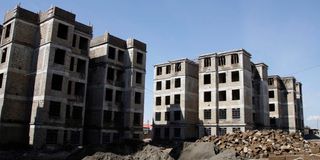
Affordable Housing Project in Elburgon, Nakuru County on July 12, 2024. The project which has 220 units is expected to be completed by September this year.
In Mombasa’s Shimo La Tewa Prison, when some 39 warders grew impatient with a stalled housing project, they used their money to install doors and then moved into the houses. The units had no water and electricity.
In an audit on the state department, for the year ending June 2023, Auditor-General Nancy Gathungu notes:
“The SDH awarded a contract for construction of Shimo La Tewa Prison housing project in August, 2016 at a contract sum of Sh173,576,615. The project entailed construction of two blocks of 100 units. Each block comprised of 32 studio units on the ground floor, 14 – two-bedroomed units on the first and second floors and four – three-bedroomed units on the third floor.”
“Review of records revealed that the contract was terminated when the project was at approximately 90 percent completion stage. Upon termination of the contract, the State department re-advertised tender for completion of the remaining works.”
“Further, the building had been partially occupied by prison warders despite the building not having been completed and handed over to the authorities. The warders had occupied Block A and Block B carrying 32 units and 7 units respectively. This was after the occupants had installed their own doors and locks from their own resources. The building did not have utilities installation such as water and electricity and the tile works and final paintworks were yet to be done,”
Price cuts
At the Kenya Development Corporation (KDC), price cuts for its Oceania and Zamia apartments in Mombasa have not enticed people to buy the units developed in 2015.
And the National Housing Corporation (NHC) has equally been stuck with Sh1.3 billion unsold houses for years, with the state department for Housing (SDH) struggling with management of 50,749 government houses. More than 10,000 of these units are not generating any revenue.
This is the uphill task President William Ruto faces in his pursuit of affordable housing, with thousands of houses the government has currently proving to be a hard-sale, even as managing others gives it more headache.
President Ruto has held onto his ambition to construct 200,000 houses annually under his affordable housing program (AHP), but public agencies charged with managing the State’s housing schemes are piling stocks of unsold units, a trend that is sounding a warning on possible similar problems in the days to come.
The NHC, for instance, constructed 2,596 houses valued Sh2.8 billion from 2019 to 2023.

An excavator on the land earmarked for the development of the proposed Starehe Point Affordable Housing project on June 11, 2024, the project has stalled since the groundbreaking ceremony on March 6, 2023.
But the Auditor-General reveals that by end of June 2023, NHC’s unsold houses were valued Sh1.27 billion, questioning the value for the money put in the housing schemes.
“As previously reported, despite some of the projects having been completed several years ago, the houses have remained unsold and hence they continue to be reported as inventories. Management explained that it has scaled up engagement with county governments, Saccos, Kenyans in the diaspora and other relevant institutions to market the unsold houses,” Auditor-General Nancy Gathungu noted in an audit.
The audit noted that NHC has resorted to renting out the houses, although more than a third had not attracted tenants by June last year.
NHC attributes low uptake of its houses to the public not being aware that it has the houses, but says it managed to sell Sh2 billion houses in 2022/23, which was commendable progress.
“By the end of the FY 2023/24, the Corporation had only 45 housing units available for sale valued at Sh231 million, translating to 82 per cent reduction. Also, the Corporation has over 1,200 units across the country nearing completion,” the corporation says.
On its website, the NHC has listed about 700 houses for sale between Sh1.58 million and Sh8.75 million each across Nairobi, Machakos, Homa Bay and Nyeri counties.
“Even in a butchery, there must be some meat stock you find when you go to buy. Having stocks of houses on sale is a normal thing and of importance to note is that most of the units are actually shops which are slightly expensive,” says Mr David Mathu, NHC’s Managing Director.
100,000 affordable houses
With a target to deliver 100,000 affordable houses by 2027 as it positions itself as key player in implementation of the AHP, and with ongoing projects under the program across 17 counties, the NHC faces an uphill task on how it will manage to sell them, even as it says that it is currently still conducting feasibility studies to understand market needs.
President Ruto’s AHP filled all the gaps from acquisition of public land, servicing it with infrastructure and handing it to developers who are assured of ready market for the houses by the time they break ground, but failed to reveal the strategy the government would use to ensure that the houses don’t lack buyers.
Majority of targeted beneficiaries in the AHP are low-earners, who must first deposit 10 percent of the house they want, to get it.
“The state department for housing completed 3,357 residential housing units in 2023. As a result, the value of completed residential housing units by the state department increased from Sh1.76 billion in 2022 to Sh11 billion in 2023. The increase in the number of completed buildings was partly attributed to the government’s enhancement of construction of residential buildings through the AHP,” KNBS notes in the 2024 economic survey.
But even as the state department constructed 5,946 houses between 2019 and 2023, Auditor-General reports have over the years faulted it for inability to manage over 50,000 government houses, leading to loss of hundreds of millions of shillings every year.
The latest audit on the department, for instance, notes that in the year to June 2023, the 50,749 government houses could generate annual rents totaling Sh1.347 billion at full occupancy, but Sh309.8 million (23 percent) was missed.
“The State Department has not demonstrated any strategy/efforts to improve the revenue collection,” Ms Gathungu concluded.
Housing Principal Secretary Charles Hinga did not respond to questions shared by Nation on Friday last week, which sought an explanation on his state department’s inability to manage the government houses, status of the affordable houses currently under construction and numbers of Kenyans who have opted in, and how it plans to manage them before they get buyers.
The Nation also sought to understand progress on Boma Yangu, a project that was initiated as a voluntary way for Kenyans to enroll and benefit from affordable houses since 2018 after the courts stopped the State from taxing Kenyans for the program. Mr Hinga did not respond to whatsapp messages and SMS, and was unavailable on phone calls.
Six years since the initiative was started, Boma Yangu has not gained traction among Kenyans. The SDH’s own data shows that about 30,000 Kenyans (less than 1 percent) are saving to own houses through Boma Yangu.
Sh765 million residence
In 2015, the government contracted a firm to construct a Sh765 million residence for Kenya’s Ambassador in South Africa, but the house has been idle more than eight years later.
“Audit inspection carried out in August, 2023 revealed that the Ambassador’s residence which had been completed remained vacant since it had not been furnished. In the circumstances, the Department continued to incur unnecessary rental expenses for the Deputy Head of Mission,” Ms Gathungu notes.
At the KDC, Ms Gathungu revealed that “The Board of Directors revised downwards the sale prices for one of its housing projects with a view to increasing demand for the units. However, as at 30 June, 2023, the number of unsold apartments was 11 (out of 28) and 24 (out of 36) for the Zamia Heights Apartments and Oceania Apartments respectively,” Ms Gathungu notes.
The unsold houses, valued Sh490 million, were constructed between 2015 and 2018, and the audit notes that KDC currently pays Sh4 million annual service charges on the unsold houses.
On Monday last week, the Nation sought KDC’s response on factors that have affected uptake of its houses and strategies it has employed to sell them after the action to cut prices had little success. KDC promised to provide a response by Friday August 8, but backed down in a 6.31pm email promising the responses this week.
“The KDC Board is on an Executive Retreat. We shall respond on the areas of concern on Friday when the team is back,” KDC said on Monday, July 29.
“The team returned from the work retreat yesterday evening and is currently working on a response which will be provided early next week,” it stated on Friday evening.
At the state department for public works, the construction of Voi Pool Housing project has been ongoing since 2012 and having consumed Sh463 million by June last year, and many deadline extensions later, the Auditor-General still finds that “the project was not complete as at 30 June, 2023.”
A Kenya Bankers Association (KBA) housing price index in April notes that transactions in the low-market segment in the housing sector have grown to constitute 62.3 percent of all transactions in the housing sector in the first quarter this year, from 42.1 percent by end of 2022.
“There were notable shifts in buyers’ preferences as they searched for affordable houses across regions during the quarter,” the KBA survey noted.
In the low-market segment, which has cheapest houses in Kenya’s real estate, prices played between Sh10.1 million for bungalows to Sh14.5 million for maisonettes between January and March 2024, it added.
President Ruto continues to defend the housing program on the justification that it has so far employed more than 140,000 Kenyans, putting the job creation as his primary concern.
“When I pushed the Housing program, it wasn’t about the houses, it was about the jobs,” the President said during an interview on June 30, 2024.
In December last year, he said 120,000 jobs had been created through the initiative.
KNBS, however, notes that the entire construction sector created less than 5,000 jobs in 2023.
“Employment level in construction in the public sector rose by 2.1 percent from 9,500 in 2022 to 9,700 persons in 2023 while employment level in construction in the private sector rose by 1.8 percent to 226,300 persons in 2023,” the statistics body noted.







